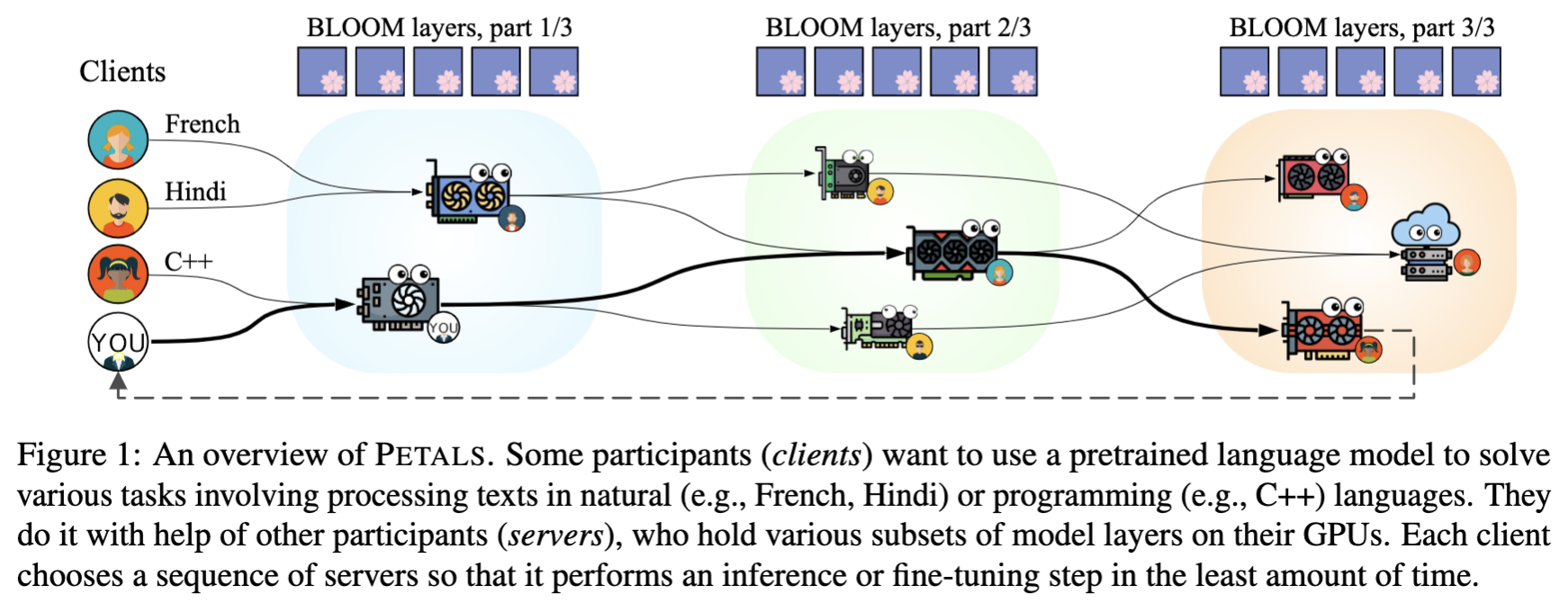Easy way to efficiently run 100B+ language models without high-end GPUs
Project description
Run large language models at home, BitTorrent-style.
Fine-tuning and inference up to 10x faster than offloading


Generate text with distributed Llama 2 (70B), Falcon (40B+), BLOOM (176B) (or their derivatives), and fine‑tune them for your own tasks — right from your desktop computer or Google Colab:
from transformers import AutoTokenizer
from petals import AutoDistributedModelForCausalLM
# Choose any model available at https://health.petals.dev
model_name = "petals-team/StableBeluga2" # This one is fine-tuned Llama 2 (70B)
# Connect to a distributed network hosting model layers
tokenizer = AutoTokenizer.from_pretrained(model_name)
model = AutoDistributedModelForCausalLM.from_pretrained(model_name)
# Run the model as if it were on your computer
inputs = tokenizer("A cat sat", return_tensors="pt")["input_ids"]
outputs = model.generate(inputs, max_new_tokens=5)
print(tokenizer.decode(outputs[0])) # A cat sat on a mat...
🔏 Privacy. Your data will be processed with the help of other people in the public swarm. Learn more about privacy here. For sensitive data, you can set up a private swarm among people you trust.
🦙 Want to run Llama 2? Request access to its weights at the ♾️ Meta AI website and 🤗 Model Hub, then run huggingface-cli login in the terminal before loading the model. Or just try it in our chatbot app.
💬 Any questions? Ping us in our Discord!
Connect your GPU and increase Petals capacity
Petals is a community-run system — we rely on people sharing their GPUs. You can check out available models and help serving one of them! As an example, here is how to host a part of Stable Beluga 2 on your GPU:
🐧 Linux + Anaconda. Run these commands for NVIDIA GPUs (or follow this for AMD):
conda install pytorch pytorch-cuda=11.7 -c pytorch -c nvidia
pip install git+https://github.com/bigscience-workshop/petals
python -m petals.cli.run_server petals-team/StableBeluga2
🪟 Windows + WSL. Follow this guide on our Wiki.
🐋 Docker. Run our Docker image for NVIDIA GPUs (or follow this for AMD):
sudo docker run -p 31330:31330 --ipc host --gpus all --volume petals-cache:/cache --rm \
learningathome/petals:main \
python -m petals.cli.run_server --port 31330 petals-team/StableBeluga2
🍏 macOS + Apple M1/M2 GPU. Install Homebrew, then run these commands:
brew install python
python3 -m pip install git+https://github.com/bigscience-workshop/petals
python3 -m petals.cli.run_server petals-team/StableBeluga2
📚 Learn more (how to use multiple GPUs, start the server on boot, etc.)
💬 Any questions? Ping us in our Discord!
🦙 Want to host Llama 2? Request access to its weights at the ♾️ Meta AI website and 🤗 Model Hub, generate an 🔑 access token, then add --token YOUR_TOKEN_HERE to the python -m petals.cli.run_server command.
🔒 Security. Hosting a server does not allow others to run custom code on your computer. Learn more here.
🏆 Thank you! Once you load and host 10+ blocks, we can show your name or link on the swarm monitor as a way to say thanks. You can specify them with --public_name YOUR_NAME.
How does it work?
- You load a small part of the model, then join a network of people serving the other parts. Single‑batch inference runs at up to 6 tokens/sec for Llama 2 (70B) and up to 4 tokens/sec for Falcon (180B) — enough for chatbots and interactive apps.
- You can employ any fine-tuning and sampling methods, execute custom paths through the model, or see its hidden states. You get the comforts of an API with the flexibility of PyTorch and 🤗 Transformers.

📜 Read paper 📚 See FAQ
📚 Tutorials, examples, and more
Basic tutorials:
- Getting started: tutorial
- Prompt-tune Llama-65B for text semantic classification: tutorial
- Prompt-tune BLOOM to create a personified chatbot: tutorial
Useful tools:
- Chatbot web app (connects to Petals via an HTTP/WebSocket endpoint): source code
- Monitor for the public swarm: source code
Advanced guides:
Benchmarks
Please see Section 3.3 of our paper.
🛠️ Contributing
Please see our FAQ on contributing.
📜 Citation
Alexander Borzunov, Dmitry Baranchuk, Tim Dettmers, Max Ryabinin, Younes Belkada, Artem Chumachenko, Pavel Samygin, and Colin Raffel. Petals: Collaborative Inference and Fine-tuning of Large Models. arXiv preprint arXiv:2209.01188, 2022.
@article{borzunov2022petals,
title = {Petals: Collaborative Inference and Fine-tuning of Large Models},
author = {Borzunov, Alexander and Baranchuk, Dmitry and Dettmers, Tim and Ryabinin, Max and Belkada, Younes and Chumachenko, Artem and Samygin, Pavel and Raffel, Colin},
journal = {arXiv preprint arXiv:2209.01188},
year = {2022},
url = {https://arxiv.org/abs/2209.01188}
}
This project is a part of the BigScience research workshop.

Project details
Release history Release notifications | RSS feed
Download files
Download the file for your platform. If you're not sure which to choose, learn more about installing packages.
Source Distribution
Built Distribution
Hashes for petals-2.2.0.post1-py3-none-any.whl
| Algorithm | Hash digest | |
|---|---|---|
| SHA256 | 2d8f24bfe0938ae31414dc27593103816b79731a4b78dbcbbb5719ad054dfc5b |
|
| MD5 | 26cb0fefe0ae10b703631f25f45e0a42 |
|
| BLAKE2b-256 | 8a00b257206f586d23bd138ea7e282855feeb614f88b21ab4f48c78ebbf15ac8 |














